Voluntary
Aid Detachment (V.A.D.)
 In
1914 there was no Ministry of Health and no one had overall control of
the hospitals, with the terrible slaughter of servicemen in France and
Belgium, the need for convalescent hospitals became urgent. The British
Red Cross Society, founded in 1870, had linked up with the order of St
John of Jerusalem in 1909 and formed the organisation known as the Voluntary
Aid Detachment (V.A.D.). In
1914 there was no Ministry of Health and no one had overall control of
the hospitals, with the terrible slaughter of servicemen in France and
Belgium, the need for convalescent hospitals became urgent. The British
Red Cross Society, founded in 1870, had linked up with the order of St
John of Jerusalem in 1909 and formed the organisation known as the Voluntary
Aid Detachment (V.A.D.).
Following
the linkup in 1909 many middle or upper class women offered to give up
their time to perform community work, mainly in hospitals. This did not
mean that all volunteers where upper class women and not all V.A.D. work
occurred in hospitals. At the outbreak of war there were already a number
of V.A.D. Auxiliary Nurses working in hospitals.
When Britain
declared war on Germany in 1914, the first effect of that declaration
was panic food buying, many local shops reported selling out completely.
Once people stopped panicking the whole community rallied around to do
everything they could to support the war effort. The war brought many
changes and the lives of the British people would never be quite the same
again. Before the outbreak of war some V.A.D. Nurses had taken short courses
at the end of which they were awarded a certificate. Qualified nurses
had three years training and soon became suspicious of the short V.A.D.
courses. Inevitably quarrels broke out and from time to time there was
open conflict. These disagreements were even printed in "Nursing
Journals" reporting the V.A.D nurses as "ignorant amateurs".
With the
outbreak of war more and more nurses were needed and it was soon evident
that some nurses had certificates and were well qualified while others
had no qualifications at all, inevitably the value of the certificates
was also questioned. The task of sorting out the problems fell to the
joint war committee. The topic of registration had become a tenuous area
of personal feuds and interests; this could only be broken by a new initiative
from another source, the war, which was to bring many changes.
The
old traditions of nursing had been shaken forcing nurses to adapt to new
conditions, and, despite the conflicts of professionals versus amateurs,
began to work together for mutual benefit. There was a new spirit in which
people began to accept change for the sake of unity in the war effort.
It was this unity that the Joint War Committee clearly set out to exploit
introducing a proposal for a new type of nursing organisation.
V.A.D. Nurses,
using the social influence available to them, organised transportation
to the conflict in France to nurse the sick and wounded soldiers. This
distinctly carved out a clear role for the V.A.D. workers; they became
very active in the war effort, assisting as nurses or orderlies in hospitals
at home and in all the major theatres of war.
The
new spirit, engendered by the war, brought volunteer after volunteer to
do what they could for the war effort. V.A.D. Volunteers also became fundraisers,
cooks, kitchen maids, clerks, ward-maids, and ambulance drivers.
Last updated
20 June, 2009
|